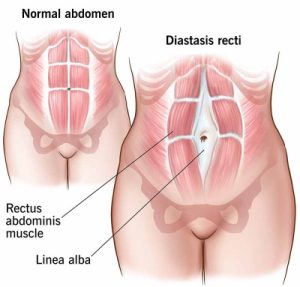
Having a baby is one of life’s truly remarkable experiences. At Sydney West Physio we have watched many of our patients take this journey and we have shared with them the joy and excitement of this wonderful time.
Pregnancy and delivery (vaginal or caesarean section) are major events and bring about much change to your body and your life. These changes impact mothers in different ways and to different degrees. For optimal postpartum recovery, it is critical to understand how the process has affected you. This enables you to rehabilitate your body properly, especially your pelvic floor and abdominal muscles.
It is common for post-natal women to experience pelvic health conditions and appropriate exercise and treatment can help women improve their conditions.
This is particularly pertinent before returning to more demanding exercise. To assist with this process Sydney West Physio offers a Physiotherapy Post-Natal Assessment which will include four key assessments.
Pelvis Assessment
- The structure of the pelvis itself is also impacted by pregnancy & childbirth. The pelvic joints soften in preparation for birth, and this can create a feeling of instability may contribute to back and pelvic pain. These joints can also be affected by delivery. We can assess the external pelvis, including sacroiliac joint (SIJ) and the pubic symphysis joint.
Rectus Abdominis Diastasis (RAD) Assessment

- The abdominal muscles are significantly stretched in pregnancy to accommodate your growing baby. In some patients, the tissue between the abdominal muscle may remain stretched, causing a gap or ‘’diastasis’’. We can measure the depth and width of your separation.
Pelvic Floor Muscle (PFM) Assessment
- Your pelvic floor muscles play a major role in continence, pelvic stability and sexual function and these vital muscles are impacted through pregnancy and delivery. We can assess the strength and endurance of your pelvic floor muscles. This is important after both vaginal and caesarean deliveries.
Prolapse Assessment
- A prolapse occurs when the organs inside your pelvis fall, bulge or protrude into the vaginal space. Common symptoms include a heaviness or dragging sensation or feeling of a bulge or protrusion at the entrance of vagina. Many women experience prolapse as a result of a vaginal delivery. We can assess if there have any changes to your vaginal wall positions following delivery and identify if you have the risk of a prolapse occurring in the future.
From this assessment we can prescribe appropriate management strategies, which may include:
- A prescription of a specific/individualised PFM program to correct, prevent and manage incontinence, bladder urgency and prolapse, or to improve sexual function.
- Appropriate post-natal exercises, including abdominal rehabilitation to speed up your recovery and help you get your pre pregnancy body back, and to better support your back and pelvis and reduce chances of developing back pain.
- Application of an abdominal binder to manage a significant Rectus Abdominis Diastasis.
- Bladder or bowel management and advice.
- Advice on return to exercise, including timing and appropriate choices for you.
- Treatment management plan if there are any musculoskeletal issues found.
When should you book in?
Physiotherapy Post-Natal Assessment is highly recommended at 6 weeks post-delivery but can still be relevant for up to 12 months.
If you’d like to book back in to see a physiotherapist with a special interest in women’s health for these assessments, please contact our Blacktown, Westmead or Norwest rooms.








